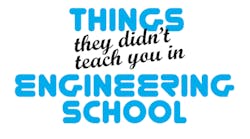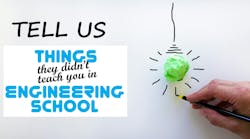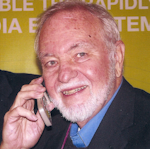Where did you acquire the core knowledge that has made you successful in your career? Though most of you EEs are college graduates, I would bet that most of your job knowledge and skills were not picked up there. So the two big questions are, 1) where did you learn your specialty topics, and 2) why aren’t colleges and universities teaching these things?
Seven critical subjects come to mind that most modern EEs need to know today. While not necessarily “hot” topics, they are critical ones, for sure:
- Power supplies
- PC board design
- Video
- Motors
- Test and measurement
- Wireless
- Digital signal processing
I am not saying that you need to know all of these in depth. At the same time, it seems to me that schools should at least cover the basics of these topics somewhere in an existing course or in a full course. Are the colleges evading their responsibility?
Power supplies are a great example. Every electronic device and product has a power supply, whether it is a battery or a highly regulated DC supply. Where do you learn about battery choices, charging, switching regulators, LDOs, power management, DC-DC converters, inverters, UPS, solar panels, IGBTs, HV supplies, wind generators, and so on? Every EE needs to know these things.
PCB layout is another critical skill—one that has become more complex than ever owing to smaller ICs, dense packaging, multi-layer boards, and super-high GHz signals. Luckily, layout software does some of the heavy lifting, but you still need some fundamentals on topics like ground planes and shielding. One professor told me EE schools do not teach this because it is technician work. Today it clearly is not.
Video is another topic that needs to be taught. It is the dominant technology in TV sets, computers, laptops, tablets, and smartphones. Where do you learn about LCD and LED displays, touchscreens, video formats, video compression methods, closed circuit TV and security cameras, machine vision, video recording, broadcast TV, satellite TV, cable TV, OTT video streaming, and 4k and 8k UHD? Not in college.
Motors are yet another missing topic. Yet motors are everywhere., whether in industry, robots, consumer appliances, toys, automobiles, computer peripherals, or even smartphones (vibration notification). You may learn basic DC and AC motor operation in school, but not the details of things like brushless DC motors, motor control, AC motor drives, and all the related electronics. Where do you go to learn that?
Then there is test and measurement. T&M is inherent in most typical EE work. You spend half your work day at a computer screen and the other half staring at a scope screen. EE work is lots of testing and measuring including design verification, troubleshooting, testing to some standard, production testing, or tracking down some EMI. If you were lucky, you got to use a scope in a college EE lab, but that might have been the extent of it. It would be nice to know how to use a spectrum analyzer, an AWG, an LCR meter, and even a vector signal analyzer so you do not appear to be an idiot the first day on the job. You do not learn this in college simply because such test gear is very expensive, and most schools just cannot afford multiple units to equip labs.
Wireless is another topic you don’t see much of in college curricula. Yet today wireless is ubiquitous. Most EEs need at least a basic working knowledge of RF circuits, signal propagation, common standards and protocols, and antennas. Again, if you were lucky, your college may have offered you an electromagnetic course where you learned the basics of wireless through the study of Maxwell’s equations. Fun stuff. Where does one get practical radio knowledge that you need to design with?
Digital signal processing is still another topic I do not see in the curriculum, yet DSP is part of everything these days. For example, practically every new wireless device (large or small) is a software-defined radio that relies on DSP for the most common process functions. Name a product today that does not use DSP in some way. DSP is math and mostly embedded, but it is a key topic today. It should be considered a fundamental and taught in school.
So what does one learn in EE schools these days? Let’s review. In a nutshell you learn the fundamentals of electricity and electronics, basic theory, devices, and circuits. There seems to be a big emphasis on digital, microcontrollers, programming, and FPGAs. Don’t forget the heavy physics and math background. Sometimes I wonder why there is still so much calculus instruction. I know you need to know it but, do you ever use it in everyday EE work? A few may, but I bet 90+% of EEs do not.
It is good to know the fundamentals and the colleges basically do a good job of it. However, I worry that that the curricula are heavily stuck in the 20th Century and not preparing graduates for real-world work. Anyway, don’t count on learning any of these critical subjects in college. The colleges and universities will not change; they will stick to what they think are the fundamentals.
So where do you learn your specialty or one of these critical topics? Not in college, obviously. But wait—if you go for a master’s or PhD degree in EE your school just may have an advanced graduate course in one of these topics. I have seen such courses in wireless and DSP, for example. But you can’t count on it. Maybe there is a free massive open online course (MOOC) available.
The real answer is, you learn this stuff on your own. EEs are mostly self-taught or autodidacts. You learn from on-the-job experience and from colleagues. You learn from books, conferences, webinars, magazines, and blogs. You do internet searches. You raid the manufacturers of their app notes, white papers, and datasheets. You learn by doing, screwing up, and re-doing.
Generally speaking, we are all self-learners—we just do not recognize that we are, and that we really can teach ourselves almost anything with the resources available. How about rocket science or brain surgery?
Looking for parts? Go to SourceESB.




